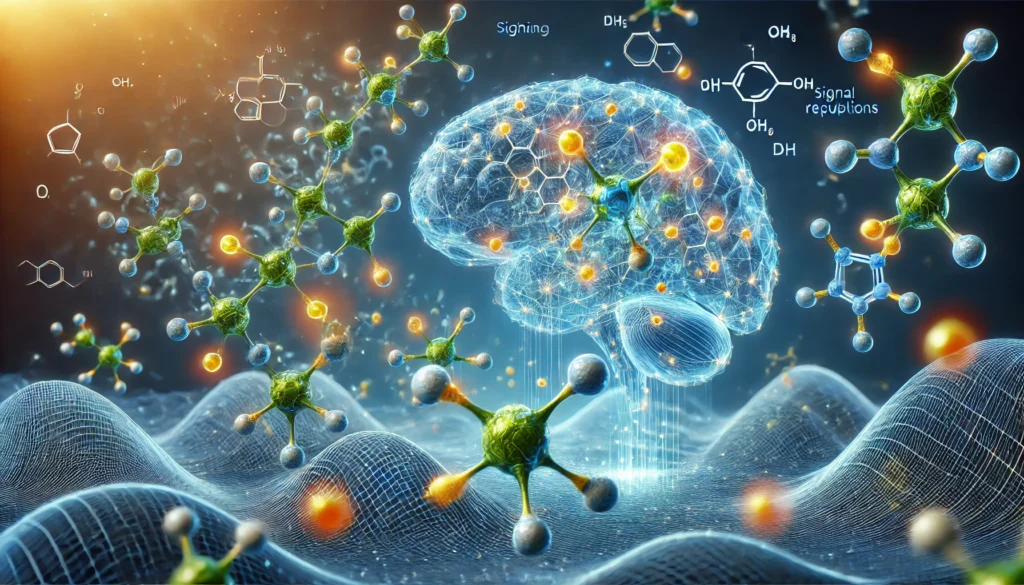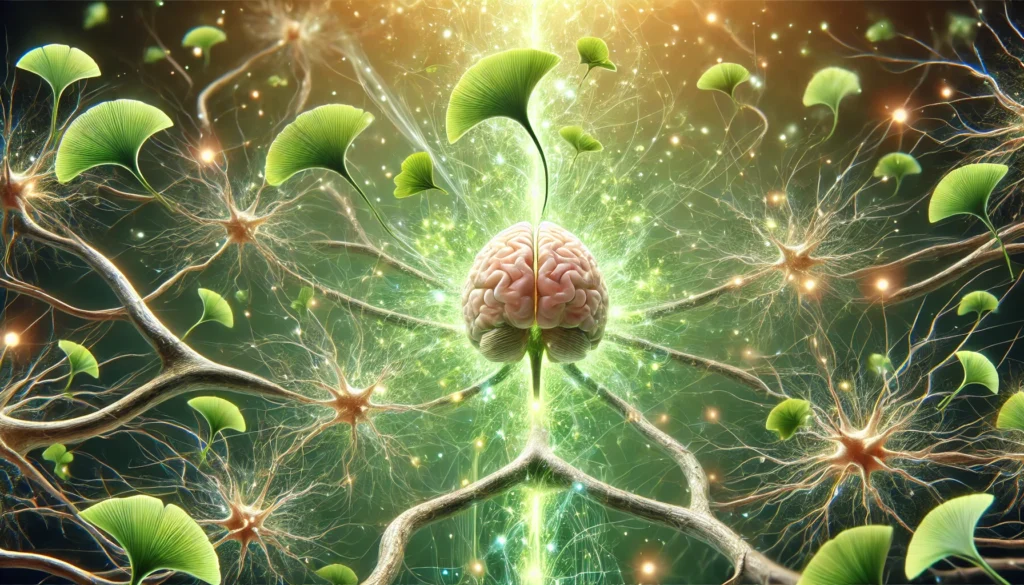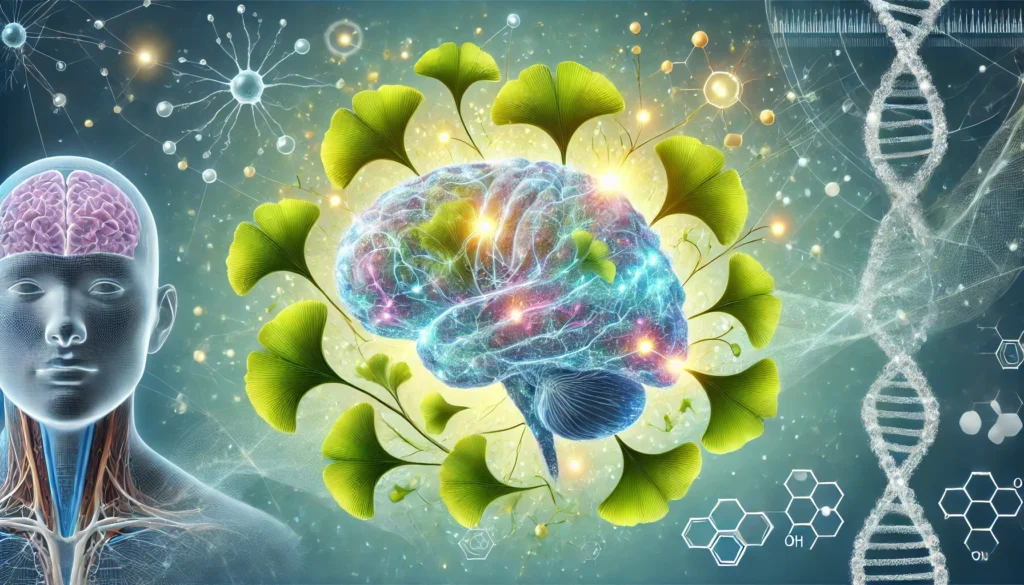Introduction: Unlocking the Ancient Power of Ginkgo for Modern Brain Health
For centuries, Ginkgo biloba has occupied a revered position in traditional medicine systems, particularly in China, where its fan-shaped leaves were prescribed to treat a variety of ailments ranging from memory loss to circulatory disorders. In recent decades, modern scientific inquiry has turned its attention to this ancient botanical to better understand how its unique biochemical properties influence cognitive performance, memory retention, and overall brain vitality. Central to this growing body of research is the exploration of the ginkgo biloba mechanism of action—how the plant exerts its physiological effects at the cellular and systemic levels. This interest is far from academic. With global rates of cognitive decline, neurodegenerative diseases, and attention-related disorders on the rise, identifying natural, evidence-based solutions for brain support is more crucial than ever.
You may also like: Ginkgo Biloba Benefits for Creative Thinking: How This Ancient Herb Supports Cognitive Clarity and Focus
The appeal of Ginkgo biloba lies not just in its long history but in its complex pharmacological profile. Rich in flavonoids, terpenoids, and organic acids, the extract derived from its leaves interacts with multiple neurological pathways, including those related to blood flow, neurotransmitter activity, and oxidative stress. Its multitargeted effects make it a particularly interesting subject for those researching nootropics, or substances that may enhance cognitive function. When we speak of the ginkgo mechanism of action, we are referring to a spectrum of biological processes—from microvascular improvements to synaptic modulation—that collectively contribute to its impact on mental clarity, alertness, and even emotional resilience.
This article aims to unpack the scientific intricacies behind how Ginkgo biloba supports brain health and cognitive function. Drawing from peer-reviewed literature, clinical trials, and biochemical studies, we will explore the physiological pathways influenced by Ginkgo biloba, its neuroprotective mechanisms, and its potential in both preventive and therapeutic contexts. We will also delve into its limitations and safety considerations, providing a balanced and research-driven perspective. Whether you’re a health-conscious individual, a student looking for cognitive support, or a clinician seeking integrative approaches, understanding the ginkgo biloba mechanism of action can offer profound insights into optimizing brain performance naturally.

The Pharmacological Complexity of Ginkgo Biloba: A Multicomponent Botanical with Multifaceted Actions
Ginkgo biloba’s effectiveness is not rooted in a single compound but in a symphony of active constituents that work synergistically. The most studied extracts, particularly the standardized form known as EGb 761, contain approximately 24% flavone glycosides and 6% terpene lactones. These compounds are primarily responsible for the ginkgo biloba mechanism of action, influencing everything from cerebral blood flow to neurotransmitter activity. Flavonoids such as quercetin, kaempferol, and isorhamnetin offer antioxidant benefits by scavenging free radicals and stabilizing cellular membranes. Meanwhile, terpene lactones—specifically ginkgolides A, B, and C, as well as bilobalide—demonstrate neuroprotective and anti-inflammatory properties.
One of the core reasons Ginkgo biloba is so compelling in the field of cognitive enhancement is its ability to act on multiple targets within the central nervous system. While pharmaceuticals often act on isolated pathways, the botanical complexity of Ginkgo biloba allows it to interact with an array of molecular and physiological systems. This broad-spectrum functionality is at the heart of its mechanism of action. It interacts with neurotransmitter systems such as acetylcholine, dopamine, and serotonin, modulates vascular tone and perfusion, and influences gene expression related to oxidative stress and apoptosis.
Another notable aspect of the ginkgo mechanism of action is its lipophilic nature, which allows active compounds to cross the blood-brain barrier. This is essential for any cognitive enhancer, as it ensures that the bioactive molecules reach the brain in therapeutically relevant concentrations. Once there, they may influence synaptic plasticity, enhance mitochondrial function, and protect neural tissues from ischemic and oxidative damage. Importantly, these effects have been validated through both in vitro and in vivo studies, adding a layer of scientific credibility to traditional uses.
In addition to its immediate pharmacological actions, Ginkgo biloba also appears to have adaptive benefits, improving the brain’s resilience over time. Research indicates that chronic administration can lead to upregulation of antioxidant enzymes and increased density of synaptic connections, both of which are critical for long-term cognitive performance. These findings suggest that the ginkgo biloba mechanism of action may include both acute and cumulative effects, making it valuable not only for short-term focus and clarity but also for long-term brain health.

Frequently Asked Questions (FAQ): Understanding the Ginkgo Biloba Mechanism of Action for Brain Health
1. How does the ginkgo biloba mechanism of action differ from pharmaceutical cognitive enhancers?
Unlike synthetic nootropics that often target a single receptor or neurotransmitter system, the ginkgo biloba mechanism of action is inherently multi-faceted. It influences cerebral blood flow, antioxidant defenses, neurotransmitter levels, and even mitochondrial function simultaneously. This makes Ginkgo biloba a gentler but more holistic approach to cognitive support. Rather than providing a dramatic spike in mental energy or alertness, its effects tend to build gradually, supporting long-term brain health. This mechanism of action is especially appealing to those who prioritize natural, integrative solutions over fast-acting pharmaceuticals.
2. Can Ginkgo biloba support focus and attention in high-stress environments?
The ginkgo mechanism of action includes modulating the hypothalamic-pituitary-adrenal (HPA) axis, which governs the body’s stress response. By promoting better oxygen delivery and reducing oxidative stress in the prefrontal cortex—the region responsible for executive function—Ginkgo biloba may help maintain sharper attention under pressure. This is particularly useful in fast-paced work settings or academic environments where multitasking and mental clarity are essential. It doesn’t act like a stimulant but rather as a cerebral adaptogen, helping the brain maintain equilibrium during cognitive strain. These unique effects distinguish it from other natural supplements that might only support relaxation or only increase energy.
3. How long does it take to notice cognitive benefits from Ginkgo biloba?
While some individuals may feel subtle improvements in focus or mental clarity within a few days, the full ginkgo biloba mechanism of action typically unfolds over several weeks. Research suggests that continuous supplementation for at least four to six weeks is necessary for measurable cognitive enhancement, especially in areas such as memory retention and mental processing speed. This delay reflects the cumulative nature of its physiological effects, such as improved microvascular circulation and neuroprotection. Unlike fast-acting stimulants, Ginkgo biloba’s mechanism involves supporting underlying brain health, not merely masking fatigue. Over time, this steady impact can translate to more sustained mental performance and cognitive resilience.
4. Does the ginkgo mechanism of action offer protection against age-related cognitive decline?
Emerging evidence suggests that the ginkgo biloba mechanism of action may have neuroprotective effects that extend beyond short-term enhancement, particularly in aging populations. Its antioxidant properties combat the accumulation of free radicals, while its ability to enhance cerebral perfusion supports neurovascular integrity. These factors contribute to maintaining synaptic plasticity, a key factor in age-related cognitive health. Moreover, Ginkgo biloba may influence neuroinflammation, which is increasingly recognized as a contributor to disorders like Alzheimer’s disease. By addressing multiple underlying causes of cognitive decline, its mechanism of action provides a comprehensive defense strategy for brain aging.
5. Are there gender-specific responses to the ginkgo biloba mechanism of action?
While more research is needed, some studies suggest that hormonal differences may influence how individuals respond to Ginkgo biloba. For instance, estrogen appears to modulate blood-brain barrier permeability and neurotransmitter sensitivity, which could interact with the ginkgo mechanism of action. Women experiencing hormonal fluctuations—such as during menopause—may derive unique benefits from Ginkgo biloba’s vasoregulatory and neuroprotective properties. Men, on the other hand, may experience enhanced vascular function in ways that support both cognitive and cardiovascular health. Understanding these nuances can help tailor Ginkgo biloba use to individual physiological profiles, making its mechanism even more relevant across demographics.
6. Can Ginkgo biloba improve creativity and divergent thinking?
Creativity involves more than just raw intelligence; it requires fluid cognitive processes like associative thinking, working memory, and idea integration. The ginkgo biloba mechanism of action includes enhancing communication between brain regions by improving blood flow and reducing neural inflammation, which can create a more optimal internal environment for creative ideation. Additionally, Ginkgo’s modulation of dopamine and serotonin may encourage cognitive flexibility—a psychological hallmark of creative thinkers. While creativity is subjective and influenced by many factors, some users report enhanced mental flow and clarity during brainstorming or artistic activities. These anecdotal insights align with how the ginkgo mechanism of action supports dynamic mental processing.
7. How does the ginkgo biloba mechanism of action affect neurotransmitter systems beyond acetylcholine?
Although often associated with acetylcholine enhancement, the ginkgo mechanism of action also subtly influences dopamine, serotonin, and norepinephrine pathways. These neurotransmitters are crucial for mood regulation, motivation, and attention. By maintaining neurotransmitter balance rather than flooding the brain with excessive activity, Ginkgo biloba may stabilize emotional states while supporting alertness and motivation. This is particularly useful for individuals seeking a mood-elevating cognitive enhancer that doesn’t cause overstimulation. Its multitargeted influence across neurotransmitter systems enhances its appeal as a well-rounded nootropic.
8. What role does mitochondrial support play in the ginkgo biloba mechanism of action?
One lesser-known component of the ginkgo biloba mechanism of action involves mitochondrial function. Mitochondria are the energy-producing organelles of the cell, and their efficiency is essential for sustained cognitive activity. Ginkgo biloba has been shown in preclinical studies to protect mitochondria from oxidative stress and to enhance ATP production. This helps fuel neurons during cognitively demanding tasks, reducing mental fatigue and improving performance. Mitochondrial support may also contribute to the long-term neuroprotective benefits of Ginkgo biloba by preserving cellular energy systems as the brain ages.
9. How might the ginkgo mechanism of action evolve with new extraction technologies?
As botanical science advances, new extraction methods may allow for more precise targeting of the compounds responsible for the ginkgo biloba mechanism of action. For example, nanoparticle delivery systems or liposomal formulations could increase bioavailability and target delivery to specific brain regions. This could amplify benefits while reducing the dosage required to achieve therapeutic effects. Additionally, researchers are exploring synergistic formulations that combine Ginkgo biloba with other nootropics to enhance its multitargeted action. These innovations may pave the way for a new generation of Ginkgo-based cognitive supplements that refine and expand its established mechanism of action.
10. Are there specific populations who might benefit most from the ginkgo biloba mechanism of action?
The ginkgo mechanism of action may be particularly advantageous for individuals with compromised microvascular health, such as older adults, those with diabetes, or individuals experiencing post-COVID cognitive fog. Students and knowledge workers under chronic cognitive load may also find its multi-pathway support beneficial for sustained mental performance. Additionally, emerging evidence suggests that those in high-pollution environments may benefit from Ginkgo biloba’s neuroprotective antioxidant effects. The ability of its mechanism to adapt across diverse physiological contexts reinforces its relevance in modern wellness strategies. Personalization of usage based on age, health status, and lifestyle can enhance the safety and efficacy of Ginkgo biloba supplementation.

Enhancing Cerebral Blood Flow and Oxygenation: A Foundational Mechanism for Cognitive Support
Among the most consistently documented benefits of Ginkgo biloba is its ability to enhance cerebral blood flow, a foundational mechanism that supports virtually all aspects of brain function. Adequate blood flow is critical for delivering oxygen and nutrients to the brain, maintaining cellular metabolism, and clearing metabolic waste. Even slight reductions in cerebral perfusion can result in cognitive impairments, fatigue, and diminished alertness. Therefore, the ginkgo biloba mechanism of action that involves improving circulation is of profound interest to both clinicians and biohackers seeking to optimize cognitive performance.
Terpene lactones, particularly ginkgolides and bilobalide, play a pivotal role in modulating vascular tone and reducing blood viscosity. These compounds influence nitric oxide pathways, leading to vasodilation and improved microcirculation, especially in capillary-rich areas of the brain such as the hippocampus and prefrontal cortex. This increased perfusion enhances the delivery of glucose and oxygen to neurons, fueling synaptic activity and supporting higher-order cognitive processes like memory, attention, and executive function.
Clinical studies have validated these effects, showing measurable improvements in cerebral perfusion in subjects administered Ginkgo biloba extract. Advanced imaging techniques, such as transcranial Doppler ultrasonography and single-photon emission computed tomography (SPECT), have demonstrated increased blood flow velocity and regional cerebral blood volume in key brain regions. These physiological changes correlate with improved performance on cognitive tasks, lending empirical support to the ginkgo mechanism of action related to circulation.
Interestingly, enhanced blood flow is not only beneficial for healthy individuals but also for those experiencing cognitive decline. In patients with vascular dementia or age-related cognitive impairment, Ginkgo biloba has shown promise in improving clinical symptoms and quality of life. While the exact mechanisms are still being elucidated, the hypothesis that improved microcirculation underpins these benefits is strongly supported by both preclinical and clinical research. This makes Ginkgo biloba a compelling adjunct in integrative treatment strategies for age-associated neurological conditions.
Furthermore, the enhancement of cerebral blood flow may also have implications for emotional regulation and stress resilience. The prefrontal cortex, which governs emotional processing and decision-making, is particularly sensitive to oxygen and glucose availability. By improving perfusion to this region, Ginkgo biloba may support not only cognition but also mood and psychological well-being. This expanded understanding of the ginkgo biloba mechanism of action underscores its potential as a holistic brain-supportive agent.
Further Reading:
Ginkgo biloba: An updated review on pharmacological, ethnobotanical, and phytochemical studies
Traversing through half a century research timeline on Ginkgo biloba, in transforming a botanical rarity into an active functional food ingredient
brain supplement benefits, natural nootropics, cognitive enhancer herbs, neuroprotective botanicals, memory support supplements, mental clarity aid, herbal brain boosters, flavonoid antioxidants, cerebral circulation support, neurovascular health, plant-based cognitive support, herbal remedies for memory, focus and concentration herbs, anti-aging brain nutrients, mood and cognition support, adaptogens for stress, herbal extract for brain fog, mental performance support, holistic brain health, EGb 761 extract benefits
.Important Note: The information contained in this article is for general informational purposes only, and should not be construed as health or medical advice, nor is it intended to diagnose, prevent, treat, or cure any disease or health condition. Before embarking on any diet, fitness regimen, or program of nutritional supplementation, it is advisable to consult your healthcare professional in order to determine its safety and probable efficacy in terms of your individual state of health.
Regarding Nutritional Supplements Or Other Non-Prescription Health Products: If any nutritional supplements or other non-prescription health products are mentioned in the foregoing article, any claims or statements made about them have not been evaluated by the U.S. Food and Drug Administration, and such nutritional supplements or other health products are not intended to diagnose, treat, cure, or prevent any disease.


